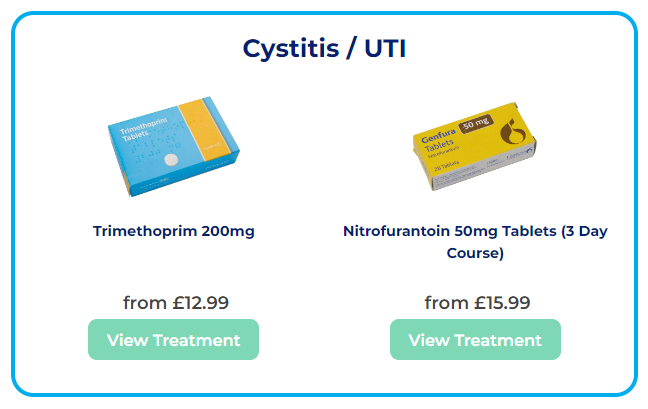It’s the simple additions to your service that improve patient satisfaction, start offering medicines delivery to all of them today

The Ultimate Guide To Cystitis & UTIs
Apr 21, 2022 Cystitis / UTI
The Ultimate Guide To Cystitis & UTIs
What is Cystitis?
Cystitis is a painful urinary tract infection that causes a burning sensation when going to the toilet. Sufferers feel an increased and urgent need to pee and feel generally unwell. Most cases go away after a few days without medical intervention. However, in some cases antibiotics are needed and if left untreated, cystitis can have other negative effects. Both women and men can suffer from the condition, but it is more common in women.
What Causes Cystitis?
Cystitis is a urinary tract infection (UTI) caused by bacteria entering the bladder. The bacteria then causes inflammation of the bladder, causing a lot of unpleasant symptoms.
Although women and men can suffer from the condition, women are more prone to the infection because their urethra and back passage are closer together making it easier for bacteria to enter the bladder.
Causes of bacteria entering the bladder include wiping from back to front after going to the toilet, sexual intercourse, using a diaphragm or using tampons.
As well as this, if you have certain health conditions, you could also be more susceptible to having cystitis. The following conditions increase your risk of having it; not emptying your bladder, pregnancy, cancer treatment, diabetes, menopause, weakened immune system, using highly scented body wash and taking recreational drugs such as ketamine.
BROWSE CYSTITIS TREATMENTS HERE
What are the Symptoms of Cystitis?
To summarise, the infection causes sufferers to feel generally unwell, have a fever, painful urination, an urgency to pee, passing bloody or cloudy urine, pain during sex and backache. If the infection spreads to your kidneys you may also; feel nauseous, vomit, have back pain or chills.
The Main Symptoms of Cystitis:
-
Feelings of increased and urgently needing to pass urine - The irritation of cystitis causes your bladder to think that it is full when it is not. Sufferers feel an urgent need to go to the toilet but tend to produce very little water when they urinate. Urine is often cloudy and very concentrated.
-
Burning sensation - When you have cystitis it feels as you are passing shards of glass when you are urinating, the pain is so intense that it can bring tears to your eyes and leave you breathless. Occasionally you may pass blood.
-
Pelvic Discomfort -You may feel that your pelvis is uncomfortable and that there is a feeling of pressure in your abdomen. This is the effect of the inflammation caused by the infection.
-
Low Grade Fever - You may find that your temperature is elevated, this is again caused by your body trying to fight the infection.
If you suffer from the following cystitis symptoms you should arrange to see your Doctor immediately:-
-
Back or side pain.
-
Fever and chills.
-
Nausea and vomiting.
When Should you Consult a Doctor About a UTI?
Symptoms that continue for a long period of time and seem to be getting worse require you to visit your doctor. The NHS Choices website suggests you consult your doctor if the following occurs:-
-
You need to confirm that it is cystitis.
-
Symptoms last longer than a few days.
-
You suffer from it frequently.
-
You have blood in your urine, a temperature and pain in your side.
-
You are pregnant.
-
If you are a man with symptoms.
-
If your child has symptoms.
How Do You Treat Cystitis?
Cystitis is a bacterial infection that responds well to antibiotics. Treatment for cystitis includes antibiotics such as Nitrofurantoin and Trimethoprim, which cure bacterial infection. Trimethoprim is an antibiotic that is particularly effective in treating cystitis. It works by killing the bacteria causing the infection in the bladder.
If you have been to the doctor and have been diagnosed with mild cystitis the following measures could help to ease your symptoms:-
-
Drink plenty of water - this will flush out your bladder and make sure that your urine is diluted.
-
Use a hot water bottle on your stomach or between your thighs to relieve the pain.
-
Cranberry juice is thought to help ease symptoms, although there is no scientific proof behind the theory.
-
Over the counter, anti-inflammatories such as Ibuprofen can also help ease the pain.
Can Cystitis Be Treated Without Antibiotics?
Most cases clear up themselves in a few days after self-care. Resting with a hot water bottle, paracetamol, Ibuprofen and plenty of freshwater treats minor conditions.
Where home remedies don’t work and your symptoms don’t improve after a few days, it is important to speak to a doctor. Antibiotics are necessary to treat persistent infections otherwise they could lead to kidney infections and further complications.
Can You Treat Cystitis with Cranberry Juice?
Many people believe cranberry juice helps to relieve symptoms but there is no scientific basis in that suggestion. Drinking lots of cranberry juice increases your liquid intake which ultimately relieves symptoms in the end.
However, the NHS is unable to see a connection between cranberry juice and cystitis relief except for the benefits of drinking the extra liquid.
How Do You Prevent Cystitis?
Cystitis can be prevented, by following some best practice hygiene routines. This includes wiping from front to back, emptying your bladder when needed, avoiding bubble baths with a strong scent, wearing cotton underwear, washing and emptying your bladder after sexual intercourse and drinking plenty of water.
How Long Does Cystitis Last?
Most of the time drinking plenty of water, over the counter painkillers, avoiding sex and using a hot water bottle, can make a UTI clear up in days.
Bacterial cystitis is curable and controllable with medication, however, some women have recurring bouts of the condition and find it difficult to manage.
Recurring Cystitis
Most women suffer from cystitis occasionally and are able to treat it at home themselves. Others have recurring cystitis which causes great discomfort and affects everyday life. Whatever the cause of recurring cystitis it is important to visit your doctor to avoid further complications such as kidney infections.
Some women suffer from recurring UTIs for no obvious reason. An underlying kidney problem, sexual intercourse, internal contraceptives and hormones are possible reasons repetitive infections occur.
A predisposition to bacterial infections and an overactive immune system is also a contributing factor. The most effective treatment for frequent cystitis is to take antibiotics as soon as the symptoms occur.
Lifestyle changes rarely reduce the chances of getting an infection and antibiotics don’t always provide a complete solution. It is vitally important to visit your doctor if you continually suffer from symptoms.
Interstitial Cystitis
Interstitial cystitis has similar symptoms to the bacterial version but is not a bacterial infection. Interstitial cystitis is bladder pain affecting the urinary tract lasting six weeks or more without an infection.
The intensity of pain varies and some people get it sporadically while others suffer chronic pain. Treating this condition is more complex because the cause is physical damage to the bladder and pelvic area.
Most people who have interstitial cystitis also have an underlying pain condition such as fibromyalgia, chronic fatigue, irritable bowel syndrome or Lupus. Symptoms include; pelvic pain, the urgency to urinate, needing to wee more often and needing to go to the toilet at night time.
Determining the cause is a challenge for doctors because the bladder is often inflamed, ulcerated, scarred or rigid. Treating the condition is also complicated due to the many different causes.
How to Treat Interstitial Cystitis?
Lifestyle changes and appropriate medication can relieve symptoms. Lifestyle changes such as; avoiding some foods, reducing stress, giving up smoking, drinking less liquid and going to the toilet regularly help to reduce symptoms.
Medication including painkillers, antihistamines and drugs that help to repair the bladder lining also relieve symptoms. Sometimes medication is inserted into the bladder using a catheter.
Doctors also recommend treatment such as; physiotherapy, training the bladder, talk therapy and transcutaneous electrical nerve stimulation (TENS) which all help to deal with the pain. In the worst cases, surgery is the only option procedures include; cauterisation, bladder distention, BOTOX, an implant or increasing the size of the bladder. Sometimes if everything else fails and your discomfort is intolerable removing the bladder is the only option. (Source: NHS Choices)
How Does Being Run Down Affect Cystitis?
When you are run down you are more prone to infections like cystitis. This is because your immune system isn’t strong enough to fight off an illness. We can become run down due to; worries, stress, not eating enough or not having enough exercise. Symptoms of being run down include; tiredness, depression, indecisiveness, lack of concentration, urinary tract infections, weight gain or loss, skin problems and a general feeling of being unwell.
If you are run down infections like cystitis are just going to make you feel a whole lot worse. This is a time to look after yourself and make yourself well. As well as getting yourself checked out by your doctor you need to eat, sleep, relax and exercise well. Make sure you make time to enjoy activities that make you feel happy and lift your spirits. Drink plenty of water and prioritise yourself over others for once.
Act now, treat Cystitis online, review and purchase treatment for cystitis here.
Recent News and Blogs
-

Tree Pollen Season: Why Your Hay Fever Starts Earlier Than You Think
For many people, the arrival of Spri... Read More..
-

A Pressure-Free Guide to Feeling Confident This Valentine’s Day
Valentine’s Day often feels like it comes wi... Read More..
-

How to Overcome Weight Loss Plateaus on Weight Loss Injections
Hitting a weight loss plateau can fe... Read More..
-

How Antioxidants Protect Your Skin Daily
When we think about skincare, we often focus on co... Read More..
-

Realistic Weight Loss Expectations with Weight Loss Injections
Starting a weight loss journey is a... Read More..
-

Winter Skincare Routine for Sensitive Skin With SkinLabs and Simply Meds Online
Winter can be particularly challenging for sensiti... Read More..

